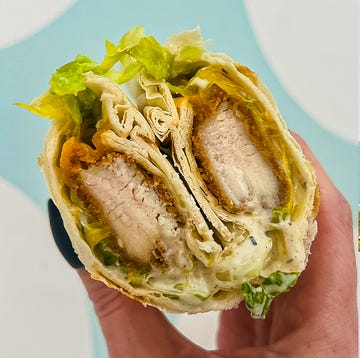In the next few weeks, people everywhere will start crafting New Year's resolutions, and if search history is any indication, many of those will focus on weight loss—and clean eating. The movement has ballooned over the past four years, according to Google Trends, spiking every January, but there's one person who won't be jumping on the bandwagon: celebrity chef Nigella Lawson.
"People are using certain diets as a way to hide an eating disorder or a great sense of unhappiness and unease with their own body," Lawson said during the JW3 Speaker Series—a conference designed to spark intellectual debate—in London earlier this week.
Earlier this year, she'd told the BBC she thinks "the notion of 'clean eating' is an implication that any other form of eating is dirty or shameful," a belief she expounded upon during the conference.
"There is a way in which food is used either to self-congratulate—you're a better person because you're eating like that—or to self-persecute, because you'll not allow yourself to eat the foods you want," she said, according to E!
Some doctors echo her concern. At its most basic level, clean eating is considered a movement to eat food in its purest, most natural state, reports Clean Eating. The danger, however, is when people start eliminating foods to the point of depriving their bodies of the calories and nutrients they need to sustain themselves.
"When the food choices become so narrow, and when one's self-worth is informed by their success or failure at clean eating, this is where the real damage occurs and makes one vulnerable to taking it too far," Lisa Geraud, registered dietician and executive clinical director of the Eating Recovery Center of Washington, told Delish via email.
It's that point—that a person's self-worth can be tied to their weight—that Lawson also says she doesn't believe in congratulating people for losing weight.
"When women say, 'You have lost weight,' that is not a good thing," she said on Ireland's Late Late Show (via Salon). "Generally, I think it's not good if it's thought that being thinner is always better, and then what happens as a result of that is that somehow you're a better person."
For Lawson, it seems the big issue with certain diets is the mentality that it reinforces—and when that mentality can turn dangerous to a person's health. She mentioned on the show that her views were influenced from knowing people who had gotten very thin and very ill, and mentioned that she realized much later in life that her mother had struggled with an eating disorder.
"I knew she had a thing about thinness, but I worked it out later. When she was dying [of cancer], she allowed herself to eat," Lawson said during the Late Late Show appearance. "To wait until you've got a terminal disease to enjoy eating is an awful thing."
Lawson's latest statements come just weeks after British TV host Carrie Armstrong spoke out about how her interest in clean eating turned into a dangerous obsession, which caused her weight to plummet from 154 pounds to 91. During that time, she says her teeth started to crumble, she started losing her hair, and she stopped having periods, all likely from malnutrition. Armstrong went from cutting out meat, carbs and sugar to, at one point, eating just organic melon.
If you think you know someone who is struggling with orthorexia, Geraud recommends speaking to him or her about what you see rather than trying to diagnose the person. "For example, [saying] 'I see that you only eat certain foods and you feel guilty if you eat other foods,' and 'I'm concerned about you, and I'm concerned that you don't have as much energy as you used to; you're critical about the things that I'm eating,'" she writes.
She also suggests talking to others who care about the person, since it often takes several people to encourage the person to get help.
If you or someone you know needs help, visit the National Eating Disorders Association (NEDA) website or contact the NEDA Information and Referral Helpline at 1-800-931-2237.
Follow Delish on Instagram.














